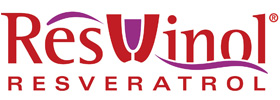ResVinol® - Natural Resveratrol w/Red Wine Polyphenols
ENI’s ResVinol® Natural Resveratrol provides the synergy of two powerful ingredients: natural resveratrol (standardized to the most biologically active trans-isomer), and red wine polyphenols. ResVinol® is standardized to contain 25% trans-Resveratrol and 20% of the valuable range of polyphenols found in grapes and red wine.
The health benefits of red wine polyphenols
Polyphenols are secondary plant metabolites synthesized during the development of the grape berry as a response to stress conditions. They are important constituents in red wines that contribute to the sensory properties and antioxidant activity of the wines. They also have significant health benefits, as outlined in a number of published studies. For example, a recent comprehensive review published in the Journal of Molecular Biology, and other peer reviewed articles discuss the following benefits [1]:
Improvement in heart health and antioxidant benefits: Experts believe that this is largely due to the antioxidant properties of polyphenols, which help reduce chronic inflammation, a risk factor for heart disease. [2]
Improvement in blood pressure and LDL cholesterol levels: Two recent reviews link higher polyphenol consumption to lower blood pressure and LDL (bad) cholesterol levels, as well as higher HDL (good) cholesterol. [3]
Digestion and probiotic benefits: Polyphenol consumption may benefit digestion by promoting the growth of beneficial gut bacteria while fending off harmful ones. [4]
The health benefits of resveratrol
Resveratrol is one of the key polyphenols found in red grapes and red wine. Since resveratrol was illustrated to be one of the key factors in wine contributing towards the French paradox (high intake of saturated fat but low mortality from coronary heart disease), it has attracted overwhelming interest worldwide, and many epidemiological studies have investigated the relationship between resveratrol consumption and human health.
The benefits of resveratrol enhance those of the wider base of polyphenols found in red wine. These include: anti-oxidant, cardiovascular, immune and bone health support. [5]
ResVinol® is one result of Ethical Naturals (ENI) decade of working on the development and analysis of the different categories of polyphenols. These include: flavonoids, phenolic acids, anthocyanins, proanthocyanins, resveratrol, and others. From this work ENI makes available a wide range of high-level polyphenol-based ingredients for use in supplements, powders and beverages. These include: VinCare patented whole grape extract, ResVinol natural resveratrol and red wine extract, Resveratrue 98% natural resveratrol, and Cranberex standardized cranberry extract supported by clinical studies at Rutgers University.
[1] Buljeta I, Pichler A, Šimunović J, Kopjar M. Beneficial Effects of Red Wine Polyphenols on Human Health: Comprehensive Review. Curr Issues Mol Biol. 2023 Jan 17;45(2):782-798. doi: 10.3390/cimb45020052. PMID: 36825997; PMCID: PMC9955827.
[2] Tangney CC, Rasmussen HE. Polyphenols, inflammation, and cardiovascular disease. Curr Atheroscler Rep. 2013 May;15(5):324. doi: 10.1007/s11883-013-0324-x. PMID: 23512608; PMCID: PMC3651847.
[3] Cheng YC, Sheen JM, Hu WL, Hung YC. Polyphenols and Oxidative Stress in Atherosclerosis-Related Ischemic Heart Disease and Stroke. Oxid Med Cell Longev. 2017;2017:8526438. doi: 10.1155/2017/8526438. Epub 2017 Nov 26. PMID: 29317985; PMCID: PMC5727797.
[4] Marín L, Miguélez EM, Villar CJ, Lombó F. Bioavailability of dietary polyphenols and gut microbiota metabolism: antimicrobial properties. Biomed Res Int. 2015;2015:905215. doi: 10.1155/2015/905215. Epub 2015 Feb 23. PMID: 25802870; PMCID: PMC4352739.
[5] Meng X, Zhou J, Zhao CN, Gan RY, Li HB. Health Benefits and Molecular Mechanisms of Resveratrol: A Narrative Review. Foods. 2020 Mar 14;9(3):340. doi: 10.3390/foods9030340. PMID: 32183376; PMCID: PMC7143620.




